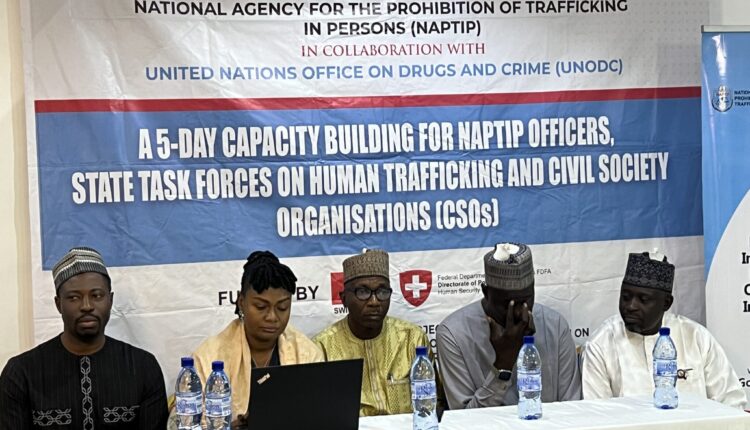Borno Task Force, Security Agencies Undergo Special Training to Bolster Fight Against Human Trafficking
No fewer than 40 security personnel, members of Civil Society Organisations (CSOs), and the Borno Task Force on Human Trafficking have commenced a five-day capacity-building workshop on data collection in Maiduguri.
The workshop, organised by the National Agency for the Prohibition of Trafficking in Persons (NAPTIP) in collaboration with the United Nations Office on Drugs and Crime (UNODC), aims to strengthen stakeholders’ capacities in the use of harmonised data collection tools. This initiative is part of implementing Nigeria’s National Action Plan (NAP) on Human Trafficking (2022–2026).
Funded by the Swiss Government, the project, titled “From Policy to Action,” seeks to develop evidence-based strategies to combat human trafficking, enhance inter-agency coordination, and protect victims’ rights.
Importance of Accurate Data Collection
The Director-General of NAPTIP, Binta Bello, represented by the Assistant Director of Research, Programme and Development, Mr. Olatunji Rasheed, highlighted the pivotal role of data in combating human trafficking.
“With reliable data, we can track trends, allocate resources efficiently, and develop evidence-based strategies to combat human trafficking,” Bello said.
She disclosed that NAPTIP had updated its data collection tools to incorporate disability indicators and promote inclusive reporting. These tools have been standardised for use across federal platforms, enabling seamless reporting under the NAP.
Bello urged participants to actively engage in the training and emphasised their roles in data collection, repository management, and timely reporting to the National Reporting Hub.
UNODC Commends Nigeria’s Anti-Trafficking Efforts
UNODC’s Country Representative, Cheikh Toure, represented by Ms. Ifeoma Kenebi, praised NAPTIP’s efforts in combating human trafficking.
“UNODC remains a long-standing partner in helping Nigeria address transnational organised crime, including human trafficking,” Toure stated.
He acknowledged the Swiss Government’s support and encouraged participants to focus on mastering the harmonised tools across the five pillars of the NAP.
Technical Training for Nationwide Impact
The Zonal Commander of NAPTIP, Mohammed Barde, highlighted the significance of accurate reporting in combating human trafficking. He noted that the training would empower stakeholders to track, monitor, and respond to trafficking cases effectively.
“These tools will enhance national response mechanisms, improve coordination among agencies, and better protect victims’ rights,” Barde said.
Participants will learn about the technical aspects of the reporting tools, ethical considerations, and best practices for data sharing. The training also includes practical sessions and presentations by seasoned experts to enhance participants’ skills.
Call for Collective Action
Abdulganiyu Abubakar, National President of the Network Against Trafficking, Abuse, and Labour (NACTAL), represented by the Borno Coordinator, Umar Gambo, emphasised the need for collective action.
“The fight against human trafficking requires strengthened partnerships and a holistic approach,” Abubakar said, commending the collaborative efforts of stakeholders.
He noted that the initiative would lead to more evidence-based interventions, dismantling human trafficking networks and protecting victims’ rights.
The workshop has already been conducted in other geopolitical zones, including the North Central, North West, and South South, with promising outcomes. Stakeholders in the North East are expected to replicate these successes, contributing to Nigeria’s nationwide fight against human trafficking.


